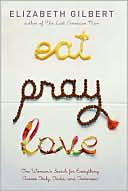Eat, Pray, Love: One Woman's Search for Everything Across Italy, India and Indonesia
Search in google:
The celebrated author of The Last American Man creates an irresistible, candid, and eloquent account of her pursuit of worldly pleasure and spiritual devotion. By the time she turned thirty, Elizabeth Gilbert had everything a modern, educated, ambitious American woman was supposed to want—a husband, a house in the country, a successful career. But instead of feeling happy and fulfilled, she was consumed with panic, grief and confusion. She went through a divorce, a crushing depression, another failed love and the complete eradication of everything she ever thought she was supposed to be. To recover from all of this, Gilbert took a radical step. In order to give herself the time and space to find out who she really was and what she really wanted, she got rid of her belongings, quit her job, left her loved ones behind and undertook a year-long journey around the world, all alone. Eat, Pray, Love is the chronicle of that year. Gilbert's aim was to visit three places where she could examine one aspect of her own nature, set against the backdrop of a culture that has traditionally done that one thing very well. In Italy, she studied the art of pleasure, learning to speak Italian and gaining the twenty-three happiest pounds of her life. India was for the art of devotion, where, with the help of a native guru and a surprisingly wise Texan, she embarked on four months of austere spiritual exploration. Finally, in Indonesia, she sought her ultimate goal: balance—namely, how to somehow build a life of equilibrium between worldly enjoyment and divine transcendence. Looking for these answers on the island of Bali, she became the pupil of an elderly, ninth-generation medicine man and also fell in love in the very best way—unexpectedly. A memoir of self-discovery, Eat, Pray, Love is about what can happen when you claim responsibility for your own contentment. It is also about the adventures that can transpire when a woman stops trying to live in imitation of society's ideals. This is a story certain to touch anyone who has ever woken up to the unrelenting need for change. The Washington Post - Grace Lichtenstein The only thing wrong with this readable, funny memoir of a magazine writer's yearlong travels across the world in search of pleasure and balance is that it seems so much like a Jennifer Aniston movie.
Discussion Questions From the Publisher 1. Gilbert writes that "the appreciation of pleasure can be the anchor of humanity," making the argument that America is "an entertainment-seeking nation, not necessarily a pleasure-seeking one." Is this a fair assessment? 2. After imagining a petition to God for divorce, an exhausted Gilbert answers her phone to news that her husband has finally signed. During a moment of quietude before a Roman fountain, she opens her Louise Glück collection to a verse about a fountain, one reminiscent of the Balinese medicine man's drawing. After struggling to master a 182-verse daily prayer, she succeeds by focusing on her nephew, who suddenly is free from nightmares. Do these incidents of fortuitous timing signal fate? Cosmic unity? Coincidence? 3. Gilbert hashes out internal debates in a notebook, a place where she can argue with her inner demons and remind herself about the constancy of self-love. When an inner monologue becomes a literal conversation between a divided self, is this a sign of last resort or of self-reliance? 4. When Gilbert finally returns to Bali and seeks out the medicine man who foretold her return to study with him, he doesn't recognize her. Despite her despair, she persists in her attempts to spark his memory, eventually succeeding. How much of the success of Gilbert's journey do you attribute to persistence? 5. Prayer and meditation are both things that can be learned and, importantly, improved. In India, Gilbert learns a stoic, ascetic meditation technique. In Bali, she learns an approach based on smiling. Do you think the two can be synergistic? Or is Ketut Liyer right when he describes them as "same-same"? 6. Gender roles come up repeatedly in Eat, Pray, Love, be it macho Italian men eating cream puffs after a home team's soccer loss, or a young Indian's disdain for the marriage she will be expected to embark upon at age eighteen, or the Balinese healer's sly approach to male impotence in a society where women are assumed responsible for their childlessness. How relevant is Gilbert's gender? 7. In what ways is spiritual success similar to other forms of success? How is it different? Can they be so fundamentally different that they're not comparable? 8. Do you think people are more open to new experiences when they travel? And why? 9. Abstinence in Italy seems extreme, but necessary, for a woman who has repeatedly moved from one man's arms to another's. After all, it's only after Gilbert has found herself that she can share herself fully in love. What does this say about her earlier relationships? 10. Gilbert mentions her ease at making friends, regardless of where she is. At one point at the ashram, she realizes that she is too sociable and decides to embark on a period of silence, to become the Quiet Girl in the Back of the Temple. It is just after making this decision that she is assigned the role of ashram key hostess. What does this say about honing one's nature rather than trying to escape it? Do you think perceived faults can be transformed into strengths rather than merely repressed? 10. Sitting in an outdoor café in Rome, Gilbert's friend declares that every city-and every person-has a word. Rome's is "sex," the Vatican's "power"; Gilbert declares New York's to be "achieve," but only later stumbles upon her own word, antevasin, Sanskrit for "one who lives at the border." What is your word? Is it possible to choose a word that retains its truth for a lifetime?




